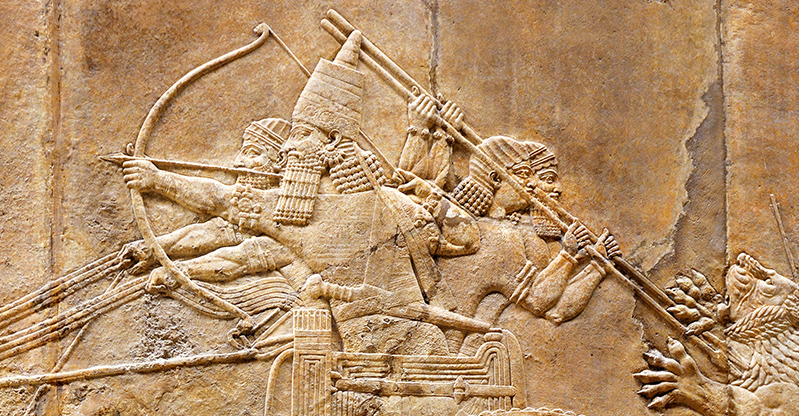Hebrew is a wonderful language with a colorful history. It is part of the story of the Jews, the so-called wandering people. It evolved out of the North-West Cainite Semitic dialects, one of many languages to spawn from there.
From the start, it was part of the identity of the Hebrews, also known as the Israelites. It was the language of the old Kingdoms of Israel, of which there were quite a few, notably at the high point of Ancient Israel, during the reigns of King David and King Solomon. It is the original language of the Bible, a text, as you know, of great importance to many people around the world to this day.
Like other languages, it was threatened with extinction at various points. But to this day, it has enjoyed a revival and is spoken in its ancient homeland still. But before this reawakening happened, it went on a thousands-of-year journey. Going through many phases in its evolution as a language, it suddenly came to a colloquial stop in the early CEs (Common Era). Hebrew ceased to be an everyday spoken tongue in about 400 CE.
When other languages began to supplant Hebrew
You may think this is a sad story, the swansong of a beautiful language. Fortunately, you know the happy ending! But before we get there, we must detour through a few places, starting with Babylon. The Babylonians sought conquest and empire through sword and blood. In 597 BCE (Before Common Era), Babylon besieged Jerusalem and left much of the city devasted. The First Temple was destroyed. And the Israelites found themselves transplanted to that empire’s capital city, their link with the Holy Land severed. This should have meant the end for the Hebrews. As was customary for the time, conquest by an enemy usually meant annihilation or assimilation for the conquered people. The latter led to the incorporation of that nation into the conquering one.
Not so for the Hebrews. Even in exile, they kept to their traditions, including their mother tongue. But they did learn to speak Aramaic. This was also a Semitic language and one spoken by their conquerors. As a common language, it was convenient to use between different peoples.
In any case, what the Babylonians sowed with the sword, they were reaped by the sword. The Persians had now become the new dominant force in the region, and they conquered Babylon. And took control of her empire. Being a more tolerant nation, they allowed the Hebrews to return to their homeland. The Hebrews took Aramaic back with them. And its usage was part of the everyday. (Which is why this ancient language is still studied by Biblical scholars today, as it formed part of Biblical scrolls.) Hebrew now had a competitor language in its own figurative backyard.
Undeniably, Alexander the Great was next-level handsome from what we can see here. Colin Farrell certainly didn’t do him justice. (Source: Wikimedia)

Alexander the Great pays a visit.
By all accounts, Alexander was handsome, dashing, and talented. He certainly had a way about him. A way of utterly destroying anything or anyone who got in his way. When he marched through Judea, he brought Hellenism, including the Greek language, with him. And the Israelites made sure not to antagonize him.
The Macedonian conqueror had defeated Persia, which meant the spoils included all territories formerly belonging to them. This encompassed the lands of the Hebrews. Noticing a trend here?
Hellenism is the culture of the ancient Greeks. It included its philosophies, fashions, and artistic dispositions. And it was now spreading across the known world, thanks to the Macedonians. Many Jews became Hellenized, and good came out of it. The Talmud, sacred today amongst the Jews, was influenced heavily by the Western school of Philosophy and philosophical thinking. The Talmud is sometimes recommended to law students to study to this day. Why? Because its argument structure is considered one of the finest in the world.
But we digress.
Hellenism resulted in a further trend of Jews going into the diaspora, exploring new lands that connected them with the wider world. In the process of doing so, they took on new tongues, such as Ancient Greek. It also became common usage in the Israelite territories. In opposition to it would form, later, rabbinical Judaism, which carried Hebrew with it and made the Jewish religion a portable one.

Rome makes its appearance on the world stage.
There is an interesting distinction between disused languages. The one is extinct languages, the other dead languages. An extinct language has no speakers anywhere in the world today. Not native. Not religious. Not scholastic. In contrast, a dead language has no native speakers, yet it is still used. For liturgical purposes, for instance. Or scholarly ones, like Latin. Latin, the language of Rome, is a dead language. But it sure is flung like stones from a sling inside courtrooms in many countries around the world.
In any case, Rome took over from the Macedonians (the trend continues…). Initially, things were peaceful between the Romans and the Jews. Until a few rebellions caused an unfriending of the relationship. The result? Rome came crashing down hard on Judea in 70 CE when the Jews rebelled against Roman rule. While the Jews were passionate and dedicated fighters, no one could ultimately stand up to the might of Rome.
The last to be defeated were the Zealots, defending their stronghold of Masada, refusing to surrender to the Romans besieging them. Their story is one of tragic heroism. Another part of this tragedy was the loss of the Second Temple. It was destroyed by Romans using relatively sophisticated explosives in those days. They dug them into the walls of the Temple and set them off, causing the kind of damage a firecracker in a closed fist might do. This resulted in more Jews flowing out into the diaspora.
But the worst was yet to come.

When Hebrew became a dead language.
There was one last rebellion. And it was epic. This was the mega-budget Hollywood movie of a rebellion. It took place in the Roman province of Judaea. This included the regions of Samaria, Idumea, and Judea, incidentally. Not all Jews in the ex-kingdoms of Israel part of the world were here. Some were in Galilee and other surrounding places, for instance. But many were. And they had had enough.
Known as the Bar Kokhba Revolt, circa 115 — 117 CE, it started over unaddressed issues between the Roman administrators and the Jewish people. Such as placing Roman statues at Jewish holy sites, as well as political tensions.
And the Judeans were initially doing well when the war began. They surrounded and obliterated a Roman garrison. Fought back successfully against reinforcement legions coming from neighboring areas like Arabia. They even managed to establish independent states for a little while. Had coins minted—that kind of thing. Such was their ferocity for freedom.
Fiercer was the significantly large part of the Roman army sent to stomp out the fires of rebellion. Hadrian, Emperor of Rome, had had enough and sent in six legions with support axillaries. In one of the most devastating wars of the time, the Romans eventually decimated the area. Though not without severe losses themselves. Two legions had to be disbanded due to severe casualties.
As a result of this, and the utter suppression by Hadrian — who was furious at the high casualty count of his legions by the Judeans — Jews were barred from entering Jerusalem. They suffered other repercussions too. Rabbinical Judaism began to be repressed. This included Jews from regions that weren’t directly involved in the rebellion and even Jewish Christians (as the two religions weren’t entirely distinct just then) who had refused to participate at all.
Among those in the province who rebelled and fought, many lay slain or were carted off as enslaved people. Many Jews, devastated, drifted into the diaspora.
As for Hebrew, already many Jews were using the Aramaic and Greek more often than their customary language as the two were considered international and cosmopolitan by this time. And, of course, Latin dominated all. Probably because of the failed rebellion, Hebrew saw a further decline that came with the withering of nationalism. Then in about 400 CE, it stopped completely as a native language.
Wherever the Jews went, the languages of their new homes became their mother tongues. But Hebrew did manage to survive in some form: both as a tongue for trading between Jews and as a Holy Language when reading scripture and the Torah.

Into the diaspora
Many Jews traveled to the Middle Eastern countries, finding oases of hope and home there. Even when Islam was born in the 7th Century, Jews were seen as “the People of the Book” and were treated well.
Not so in Europe, where they were repeatedly welcomed into a country to empower its economy, before being forced to flee under the force of arms. This was to replace their seats of power with the ethnicities associated with that particular nation. The pattern repeated itself many times. It didn’t help that Jewish communities kept to themselves, mostly, and were seen as “The Other” by local inhabitants. Willing to learn the language but unwilling to fully integrate, Jews stuck with each other. In times of disaster, this led to scapegoating and terrorizing the Jews.
Through the Jews’ travels across many countries, they remained a nation in their hearts. Even divided by geographical distances, some thousands of kilometers apart, Jews always had a spiritual home that followed them wherever they went. Whether it was in the dark, dankness of the Eastern European ghettos or the bright, sunny estates in Iraq, Jews were connected by their Torah. The Torah carried with it not just the Word of God. For the Jews, it carried an ancient language. Hebrew.
The language of home.
Subscribe to our newsletter
Learn Hebrew slang, take a virtual tour across Israel, discover the best local food and so much more
A dead language lives on
Though the Jews spoke Arabic, English, Francois, Deutsche, and Yiddish in their daily lives, they all came together to pray in Hebrew wherever they were in the world.A language cannot be forgotten that is kept in the heart.
The Jewish tradition of transcribing or creating a Torah was a delicate process. You may already know that one single mistake in the calligraphy of a single letter led to the would-be Torah being forsaken. This marred Torah was still considered sacred enough that it couldn’t simply be discarded. No. Instead, it was given a burial, returned to the earth as if a person who had passed on.
Only a Torah without a single marring could be considered Holy. This was important because it meant the natural drift of languages that occurs over time due to transmission errors couldn’t happen here. No matter which Jewish community you visited in the world, the Torah would be the same, word for word, thanks to this tradition. Due to the diligence and reverence given to it, Hebrew never changed, nor was it ever lost. Even with the Jews spread across the diaspora.
The Dead Sea, so-called because of its high salt content, makes it impossible for life to exist in it. But a return to this region by the Jews also signified that Hebrew was no longer a dead language!

Hebrew’s triumphant return.
In the 19th Century, in response to the intensity of anti-Semitism in various European countries, a world congress of Jews decided to reignite a national cause. Not since the Bar Kokvar Revolt against Rome had there been this intense desire for nationhood, self-determination, and national identity. Because Hebrew was associated with the ancient kingdoms of Israel, this naturally led to it becoming the native language of the Jews. And its speakers continued to increase in number as the migration towards what is now modern-day Israel began.
Fast forward to the 20th Century. Jewish communities, separated by eighteen centuries, were reunited in the land of Israel. All carrying the same Holy Torah. And, naturally, the language that they could all relate to each other in was Hebrew. Hebrew, since then, evolved into a modern tongue, becoming its official language.
Hebrew binds all the different Jews who came as refugees and immigrants into a land that had been lost to them for nearly two thousand years. The Roman Emperor Hadrian had intended to completely destroy the Jews in his repression and decimation of the Bar Kokhba Revolt. He wanted to wipe out Judea from the map. Literally. He changed the name of the region to Syria Palaestina.
He planned for the Jews to disperse into other cultures, becoming absorbed in them, and lose their identity. For Hebrew to not become just a dead language but an extinct one. Yet, he failed. The wheel turns, and Hebrew and its speakers have long outlived the Romans who sought their destruction. As a nationality, Israelis laugh, dance, smile, sing, share stories, and jokes in Hebrew.
But there is still a diaspora. Jews remain in many of their adopted countries to this day. Though some intend to return to their spiritual home at some point, many simply want to be part of the magic that is Israeli Hebrew. The ability to talk it fluently when visiting Israel is exhilarating for those whose hearts lie with the country. To speak to a local and receive a warm welcome is special.
Interestingly, Hebrew is one of the only examples of a dead language being reignited to life. And it remains the connective tissue between all Jewish communities around the world, with its heart in Israel.
If you want to connect to this expressive, passionate, and poetic language, consider studying it through the Rosen School of Hebrew. We are associated with the Hebrew University of Jerusalem and are the official education provider to the Israel Ministry of Foreign Affairs and the Israel Ministry of Education. Which makes us a valuable contributor to the spread of Hebrew around the world.
So, contact us! And learn to speak a language that your descendants spoke over two thousand years ago. After all, how many peoples can claim to do that?












 Available on WhatsApp
Available on WhatsApp
Join the conversation (No comments yet)